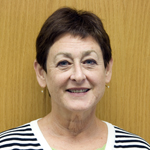New research shows that the likelihood of a medical school graduate becoming board certified is linked to age at graduation, race and ethnicity, and level of debt.
The study, by researchers at Washington University School of Medicine in St. Louis, was published this month in the Journal of the American Medical Association (JAMA).
Board certification is not required for doctors to practice medicine. But certification by the American Board of Medical Specialties (ABMS) is an increasingly important credential for physicians involved in patient care and has been associated with better patient outcomes.
To become board certified, doctors must complete a residency training program, and pass written and, in some cases, oral examinations. Some specialty boards also require additional clinical experience beyond residency training.

Andriole
“Board certification is a measure of a graduate’s knowledge and experience within a particular specialty,” says joint principal investigator Dorothy Andriole, MD, associate professor of surgery. “A lack of board certification does not mean that a physician is not qualified to provide care in a particular specialty, but lack of board certification may restrict the resources physicians can access in caring for their patients.”
For example, many hospitals consider board certification in granting physician privileges to admit and treat patients, and some health insurance companies require that physicians be board certified to be part of their provider networks.
As part of their research, Andriole and Donna Jeffe, PhD, research associate professor of medicine, examined factors linked to ABMS board certification among more than 42,000 U.S. students who graduated from medical schools between 1997-2000. Based on specialty choices made at the time of graduation, the graduates were followed through March 2009 to determine whether they became board certified.
The researchers examined eight specialty categories: internal medicine, family medicine, pediatrics, emergency medicine, radiology, surgery/surgical specialties, obstetrics and gynecology and other non-generalist specialties.
Overall, 87 percent of the medical school graduates were board certified. The percentage of board-certified graduates varied among specialty choice, from 95 percent among graduates in the family medicine category to 71 percent among graduates in the obstetrics and gynecology category.
The researchers also found that older graduates (those age 28 or older) were less likely to be board certified. In an earlier study, published last year in JAMA, the same research team found that older medical students and students with more than $50,000 of debt were more likely to have difficulties in medical school.

Jeffe
In the current study, there was not a consistent relationship between higher debt and board certification across the specialty categories. But higher debt was associated with a lower likelihood of board certification among graduates who chose obstetrics and gynecology and a higher likelihood of board certification among graduates who chose family medicine.
In addition, the researchers found that physicians who are African-American, Hispanic or in other underrepresented minority groups were less likely than their Caucasian counterparts to be board certified in all specialty choice categories except family medicine.
“More research is needed to understand the career paths of underrepresented minority graduates and the factors that disproportionately and negatively affect their likelihood of becoming board certified,” says Jeffe, also joint principal investigator of the study. “Because underrepresented minority physicians are more likely to treat underrepresented minority patients, racial and ethnic disparities in board certification may contribute to ongoing racial and ethnic health care disparities in the United States.”
Board certification is a rigorous process and must be renewed every seven to 10 years, depending on the specialty. To maintain certification, physicians must pass additional examinations that incorporate new medical concepts and knowledge.
The researchers say that the new research indicates particular groups of medical school graduates may need extra support during their residencies to continue to advance toward board certification.
The research is funded by the National Institute of General Medical Sciences.
Jeffe DB, Andriole DA. Factors associated with American Board of Medical Specialties member board certification among U.S. medical school graduates, Journal of the American Medical Association. Sept. 7, 2011.
Washington University School of Medicine’s 2,100 employed and volunteer faculty physicians also are the medical staff of Barnes-Jewish and St. Louis Children’s hospitals. The School of Medicine is one of the leading medical research, teaching and patient care institutions in the nation, currently ranked fourth in the nation by U.S. News & World Report. Through its affiliations with Barnes-Jewish and St. Louis Children’s hospitals, the School of Medicine is linked to BJC HealthCare.